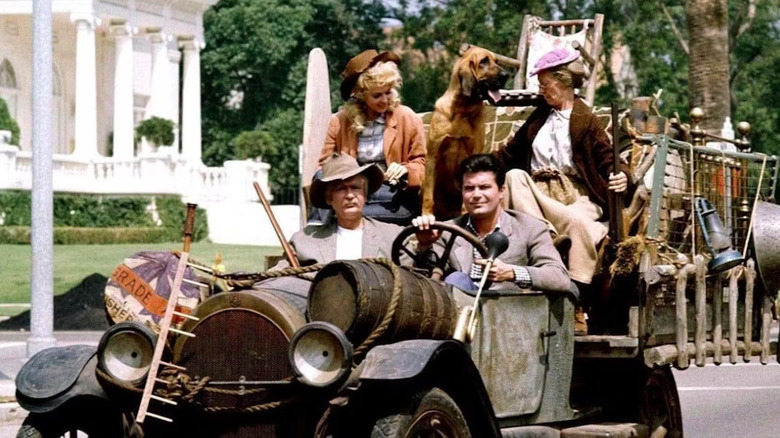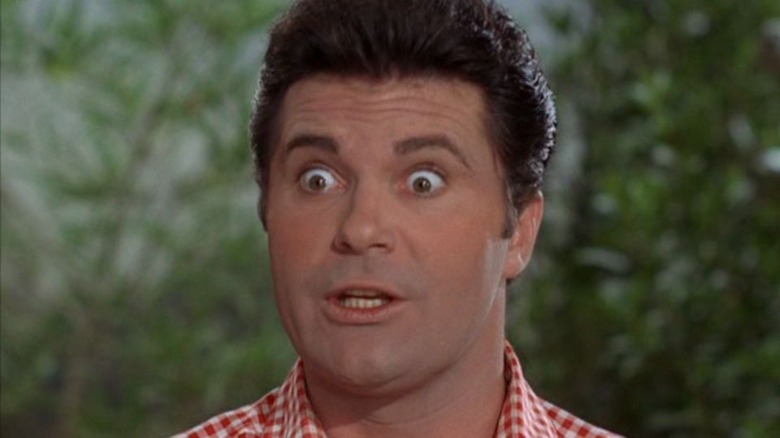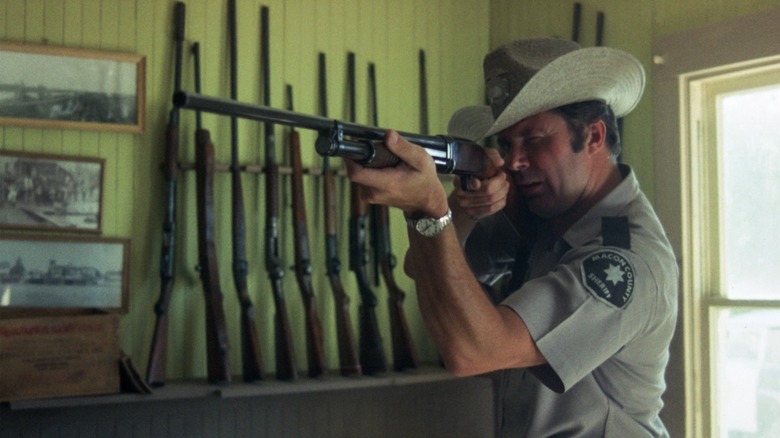The Only Major Actor Still Alive From The Beverly Hillbillies
"The Beverly Hillbillies" is the platonic ideal of a high-concept sitcom hook. At its essence, it's simply "Poor folks get stinking rich and move to Beverly Hills." That's probably all CBS needed to hear from creator Paul Henning, who, between 1962 and 1971, exploited this simple premise to the tune of nine seasons and 274 episodes. During this span, "The Beverly Hillbillies" was one of the top-rated shows on TV.
How could such a simple premise, which was never really tweaked, sustain a series for nearly a decade? This question perpetually flummoxed the nation's TV critics, who generally loathed the show, but anyone who gorged on "The Beverly Hillbillies" throughout their formative couch potato years (during its initial run or via syndication) knows the answer is obvious: it's the cast, stupid.
Buddy Ebsen was perfect casting as Jed Clampett, a gentleman of the Ozarks who accidentally discovers oil on his Missouri mountain land (he's still one of the wealthiest film/TV characters ever). His friendly, folksy demeanor was niftily complemented by Irene Ryan's irascible Granny, Donna Douglas's bombshell tomboy Elly May and the dopey, sixth-grade-educated Jethro (Max Baer Jr.). Watching this guileless clan continually frustrate the efforts of haughty Mrs. Drysdale (Harriet MacGibbon) to drive the uncouth Clampetts out of the upscale neighborhood wasn't the worst way to blow a half-hour when you were home sick from school. And even if you planned to watch another show in this time slot, you'd still tune in for the classic "Beverly Hillbillies" theme song.
The trouble with playing a cultural caricature on a silly sitcom for close to a decade is that, once it's over, you might be typecast for, say, the rest of your career. Ebsen, Ryan and Douglas all struggled with this, but they're dead now so their worries are pretty well settled. However, one cast member yet lives, and his solution to this conundrum was fairly practical: embrace your Clampett-ness, and milk it for all it's worth!
Max Baer Jr. is very much his father's face-punching son
You could call Max Baer Jr. a nepo baby, but I wouldn't advise it. According to a 2017 interview with the golf magazine Fore, he has a penchant for punching anyone who so much as mentions his dad in his presence.
His dad also punched people, but he got paid handsomely for rearranging faces as the former heavyweight boxing champion of the world. Because Max Baer was one of the most feared pugilists of the 1930s, Baer Jr. became the target of neighborhood bullies. When papa told his son to punch back, the youngster did so with gusto. Baer Jr. loved his father and vehemently defends his honor to this day — to the extent that, if he ever crosses paths with Ron Howard and Russell Crowe, he'll slug them for what he claims is an inaccurate portrayal of dear old dad in "Cinderella Man. (Good luck with that, 'cuz Crowe, whose portrayal of Baer-beatin' underdog James J. Braddock ranks among his 13 best, likes punching too.)
Certainly, Baer's side career as an actor opened a few Hollywood doors for his son, but Baer Jr. proved endearingly adept at playing dumb. Jethro's errant attempts to become everything from an office secretary to a brain surgeon generated some of the series' biggest laughs; you can't pull this off for nine seasons without possessing a good deal of talent.
For most of the 1960s, Baer Jr. was a bona fide television star ... as Jethro. When the series concluded, he predictably labored to escape the dim hick stereotype. This is the point at which actors either quietly fade from view or loudly fall to pieces. Baer Jr. cannily chose another path.
From hillbilly to Hollywood producer to... hit man?
Realizing he was always going to be associated with rural types, Baer Jr. teamed with filmmaker Richard Compton to make a hicksploitation flick in 1974 called "Macon County Line." The seamy yet sturdily crafted revenge film (co-starring Baer Jr. as a Georgia sheriff out to kill a couple of yankee interlopers wrongly accused of killing his wife) was a drive-in sensation. By the end of its long theatrical run, the $225,000-budgeted movie had grossed $19 million at the U.S. box office.
Baer Jr. parlayed this surprise success into a brief, yet highly profitable producing career. In 1976, he ambitiously struck a deal with Warner Bros. to make a film based on Bobbie Gentry's chart-topping song "Ode to Billie Joe." The picture grossed $27 million on a $1.1 million budget (perhaps inspiring other filmmakers to mine song titles for potential hits), at which point Baer Jr. seemed poised to become a leading generator of Southern fried melodramas.
The actor, who turned 86 last December, ultimately moved on from film production — though not before winning a multi-million settlement over a failed attempt to make a big-screen adaptation of Madonna's hit song "Like a Virgin." He relocated to Lake Tahoe, Nevada and began seeking ways to capitalize on his "Beverly Hillbillies" fame as a resort-and-casino owner. Here, he's only succeeded in generating lots of litigation. Nowadays, he seems content to hit the golf course, and regale reporters with his dream of becoming a hit man (not joking).
Baer Jr.'s probably a bit long in the tooth to get into the human liquidation game, but considering his tenacity you shouldn't count him out. And even at 86, you should absolutely not ask him about his dad.


